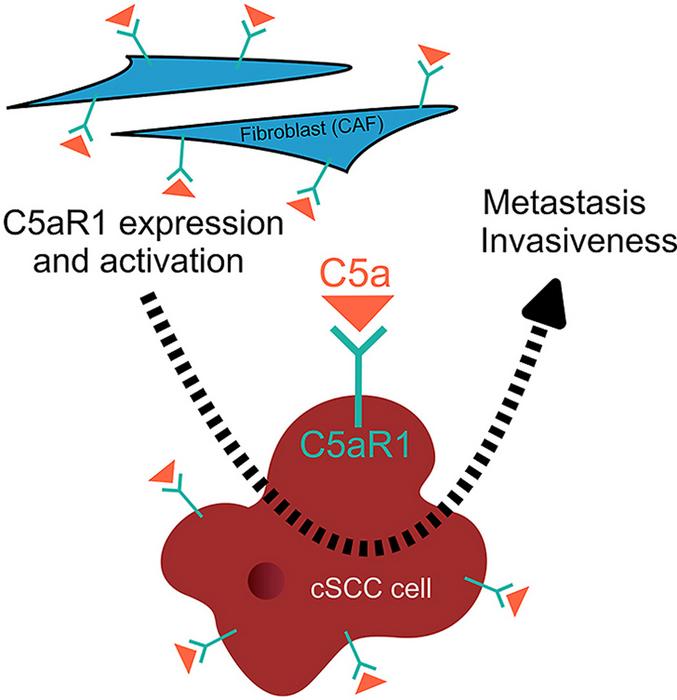C5aR1 may be a novel biomarker for metastasis risk and poor prognosis in patients with cutaneous squamous cell carcinoma (cSCC), according to a new study in The American Journal of Pathology.
C5aR1 promotes the invasion of cSCC tumor cells, and its elevated presence suggests that C5aR1 might serve as a useful prognostic marker for metastatic disease and, potentially, a target for future therapies in advanced cSCC, the researchers report.
The incidence of cSCC is increasing. It is estimated that cSCC accounts for nearly 25% of annual skin cancer deaths.
“There is an urgent need for predictive biomarkers for the prognosis of cSCC and for new therapeutic targets for metastatic cSCC,” says lead investigator Veli-Matti Kähäri, MD, PhD, Department of Dermatology, and FICAN West Cancer Research Laboratory University of Turku and Turku University Hospital, Turku, Finland, in a news release.
Studies in multiple cancers have indicated that the complement system can also contribute to tumor progression and metastasis by inducing inflammation or causing immunosuppression. This prompted researchers to investigate the interaction between C5a (which acts as a signaling molecule in cancer) and its protein receptor C5aR1 (which is found on the surface of cells) in cSCC.
Activates Signaling Pathways
Investigators noted that when C5a binds to C5aR1, it activates signaling pathways within the cell, leading to changes in cell behavior. They examined C5aR1 in the context of cSCC progression and metastasis by combining in vitro 3D spheroid co-culture of cSCC cells and skin fibroblasts, human cSCC xenograft tumors grown in SCID (Severe Combined Immunodeficiency) mice, and a large panel of patient-derived tumor samples of non-metastatic cSCC, metastatic cSCCs and cSCC metastases.
“We observed that fibroblasts in the tumor microenvironment induced C5aR1 expression in cSCC cells, [and] exposure to recombinant C5a further increased the invasiveness of cSCC cells,” says Study Author Lauri Heiskanen, MD, Department of Dermatology, and FICAN West Cancer Research Laboratory University of Turku and Turku University Hospital. “In patient-derived cSCC samples, high C5aR1 expression — both in tumor cells and in stromal fibroblasts — was linked to metastasis risk and poor survival.”
Researchers were surprised to find that fibroblasts influenced C5aR1 expression in cancer cells, and that the C5aR1 expression in stromal fibroblasts also had a role in metastasis and poor prognosis in cSCC. They also had not anticipated that C5aR1 expression would correlate with patient outcomes across a large clinical sample set.


